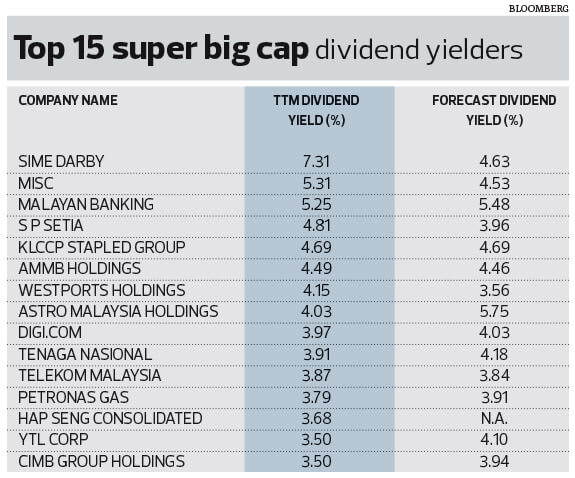Liew Jia Teng
DIVIDEND yield is a financial ratio that indicates how much a company pays out each year relative to its share price, according to Investopedia. It is one of the most common and important measures of income generation for equity investors.
When times are tough, high-yield companies tend to get tagged as “safe” and good defensive plays, owing to their ability to continue to make good payouts.
Bloomberg data shows that, on average, listed companies on Bursa Malaysia offered a dividend yield of 3.11% over the past 12 months.
Interestingly, when these companies are categorised as super big cap, big cap, mid cap and small cap in terms of market capitalisation, it appears that small caps tend to provide a higher dividend yield.
On average, super big cap companies yield 2.87%, lower than big caps (3.07%), mid caps (3.09%) and small caps (3.15%).
Nineteen of the 39 super big cap firms beat their category average and the remaining 20 — including Genting Bhd, PPB Group Bhd, Press Metal Aluminium Holdings Bhd, Axiata Group Bhd and Dialog Group Bhd, which offered a dividend yield of less than 2% — were below the category average.
The clear winners in the super big cap category are the telcos, as well as Petroliam Nasional Bhd (Petronas)-related companies.
DiGi.Com Bhd, Telekom Malaysia Bhd and Maxis Bhd offered dividend yields of 3.97%, 3.87% and 3.4% respectively.
Petronas’ units — Petronas Gas Bhd, Petronas Dagangan Bhd, Petronas Chemicals Group Bhd, MISC Bhd and KLCCP Stapled Group — were also among the top in dividend yields among super big caps.
Banking stocks offered a mixed bag of dividend payouts with the likes of Malayan Banking Bhd, AMMB Holdings Bhd and CIMB Group Holdings Bhd coming in above the category average while Public Bank Bhd, Hong Leong Bank Bhd and RHB Bank Bhd were below average.
Data also shows that local conglomerates — Sime Darby Bhd, YTL Corp Bhd and Hap Seng Consolidated Bhd — offered above-average dividend yields. Others that offered above-average yields include AirAsia Bhd, S P Setia Bhd, Tenaga Nasional Bhd, Astro Malaysia Holdings Bhd and Westports Holdings Bhd.
But it is worth noting that certain super big cap companies are expected to make smaller payouts going forward.
Take Sime Darby, for instance. Its dividend yield estimate of 4.63% has dropped from the 7.31% it offered over the past 12 months (see table). Similarly, MISC’s dividend yield is expected to decline from 5.31% to 4.53%, while Westports’ is expected to slip from 4.15% to 3.56%, and S P Setia’s from 4.81% to 3.96%.
On the other hand, the projections are that Astro and YTL Corp will pay out more.
In the big cap category, the clear winners are the real estate investment trusts (REITs) — commonly viewed as safe and defensive investments that provide long-term capital appreciation and a stable dividend yield.
CapitaLand Malaysia Mall Trust paid out a yield amounting to 8.16%, followed by MRCB-Quill REIT (8.08%), YTL Hospitality REIT (6.93%), IGB REIT (6.49%), Pavilion REIT (6.29%) and Sunway REIT (5.73%).
Companies linked to prominent tycoon Tan Sri Vincent Tan Chee Yioun, namely Atlan Holdings Bhd, Berjaya Sports Toto Bhd and Bermaz Auto Bhd, also provided above-average dividend yields of 6.52%, 6.51% and 4.46% respectively.
Property developers were not far behind with UOA Development Bhd, Mah Sing Group Bhd and Matrix Concepts Holdings Bhd offering yields of between 5.6% and 6%.
Other high-yield companies in the big cap category were Boustead Plantations Bhd, OSK Holdings Bhd, Tasek Corp Bhd, Unisem (M) Bhd and Heineken Malaysia Bhd.
REITs lived up to their reputation as defensive plays, dominating the mid cap and small cap category lists.
Hektar REIT, Al-Salam REIT, Al-‘Aqar Healthcare REIT and UOA REIT scored among the top yields in the mid cap category, while Atrium REIT, AmFirst REIT and AmanahRaya REIT ruled the small cap segment.
Other companies that beat the market average include Jasa Kita Bhd, Protasco Bhd, Cocoaland Holdings Bhd, SEG International Bhd and Heveaboard Bhd.
But sometimes fat dividend yields are not all they seem, so investors should take note. Improved yields of a handful of so-called top high-yield companies, for instance, could simply be the result of a big drop in their share prices rather than better dividends declared.


